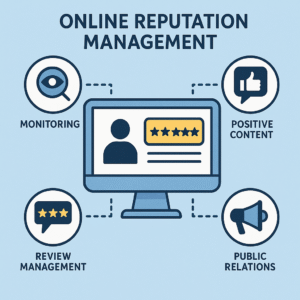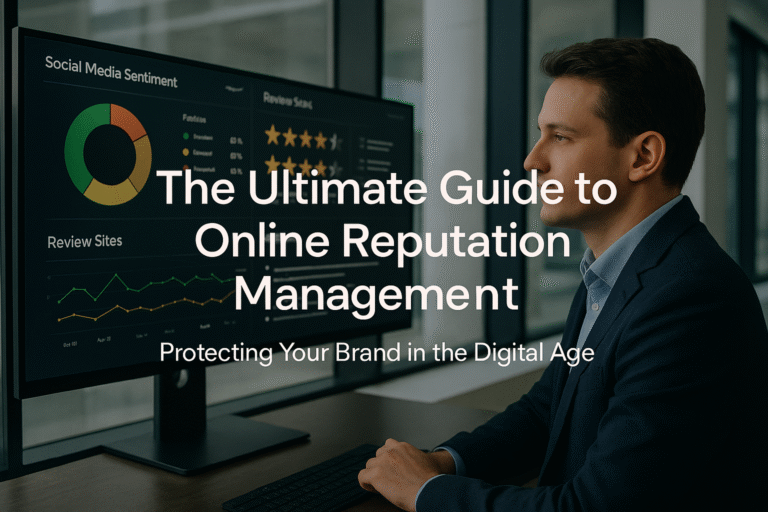A Comprehensive Guide to Online Reputation Management (ORM)
In an era where your digital footprint precedes you, mastering your online narrative is no longer optional—it’s essential. For businesses and individuals alike, the court of public opinion is now perpetually in session online. This is where Online Reputation Management (ORM) emerges as a critical discipline, shaping perceptions, building trust, and ultimately influencing success. Whether you’re a multinational corporation, a local business, or a professional building a personal brand, understanding and actively managing your online reputation is paramount.
This comprehensive guide will delve into the intricacies of Online Reputation Management, exploring its importance, core strategies, and the tools necessary to cultivate a positive and resilient digital presence. We will unpack proactive measures to build a favorable reputation and reactive strategies to repair damage when it occurs, ensuring you are well-equipped to navigate the complexities of the digital world.
What is Online Reputation Management (ORM)?
Online Reputation Management is the strategic process of monitoring, influencing, and1 managing the public perception of an individual, brand, or organization on the internet. It encompasses a wide array of activities aimed at ensuring that when someone searches for you or your business online, they find a positive, accurate, and compelling portrayal. ORM is not about censorship or hiding the truth; rather, it’s about actively participating in the online conversation to present an authentic and favorable identity.
At its core, ORM involves:
- Monitoring: Keeping a vigilant eye on what is being said about you across various online platforms, including search engines, social media, review sites, forums, and news outlets.
- Responding: Engaging with your audience in a timely and professional manner, addressing both positive and negative feedback to demonstrate that you are listening and value their opinions.
- Building: Proactively creating and promoting positive content that highlights your strengths, values, and expertise to build a strong, positive online presence.
This multifaceted approach helps in building credibility, fostering trust, and mitigating the impact of negative publicity.
The Undeniable Importance of Online Reputation Management
In today’s interconnected world, a positive online reputation is a valuable asset, while a negative one can be a significant liability. The importance of ORM extends to all facets of business and personal branding.
For Businesses:
A strong online reputation directly impacts a company’s bottom line. According to a study by Harvard Business School, a one-star increase in a Yelp rating can lead to a 5-9% increase in revenue.2 Conversely, negative reviews can deter a significant portion of potential customers. Statistics from 2024 indicate that 90% of consumers read online reviews before making a purchase, and a single negative review can drive away customers.
Key benefits of ORM for businesses include:
- Increased Trust and Credibility: A positive online presence with authentic, positive reviews and testimonials builds trust with potential customers, making them more likely to choose your products or services.
- Higher Sales and Revenue: A favorable reputation directly translates to increased customer confidence and higher conversion rates.
- Attraction and Retention of Top Talent: Prospective employees are increasingly researching a company’s online reputation before applying for a job. A positive workplace culture reflected in online reviews can be a powerful recruitment tool.
- Improved Search Engine Rankings: Search engines like Google consider online reviews and a business’s overall online sentiment as ranking factors. A well-managed online reputation can boost your visibility in search results.
- Valuable Business Insights: Monitoring online conversations provides a wealth of feedback that can be used to improve products, services, and customer experiences.
For Individuals:
In the professional realm, your online reputation is your digital resume. Employers, clients, and colleagues often turn to search engines and social media to learn more about you. A positive and professional online presence can open doors to new opportunities, while a negative or non-existent one can be a significant roadblock. For public figures, entrepreneurs, and freelancers, a well-managed online reputation is crucial for building a personal brand and maintaining credibility.
Key Pillars of a Successful ORM Strategy
A robust Online Reputation Management strategy is built on three fundamental pillars: monitoring, responding, and building.
H3: Monitoring: Your Eyes and Ears on the Digital World
You cannot manage what you do not measure. The first step in any effective ORM strategy is to establish a comprehensive monitoring system to track online mentions of your brand, key personnel, and relevant keywords. This involves regularly checking:
- Search Engine Results: What appears on the first page of Google when you search for your name or business?
- Review Websites: Keeping a close watch on platforms like Yelp, Google Reviews, TripAdvisor, and industry-specific review sites.
- Social Media Platforms: Monitoring mentions, comments, and direct messages on Facebook, Twitter, LinkedIn, Instagram, and other relevant social networks.
- Blogs and Forums: Tracking conversations on industry-specific blogs and forums where your target audience is active.
- News Outlets: Staying informed about any press coverage related to your brand.
A variety of free and paid online reputation management tools can automate this process, providing real-time alerts and detailed analytics. Tools like Google Alerts, Brand24, and Mention are popular choices for tracking brand mentions across the web.
Responding: Engaging in the Conversation
Once you are aware of the online conversation surrounding your brand, the next step is to engage in it. A timely and professional response to both positive and negative feedback is crucial.
- Responding to Positive Reviews: Thanking customers for their positive feedback shows appreciation and encourages others to share their good experiences.
- Addressing Negative Reviews: It is essential to respond to negative reviews promptly and professionally. Acknowledge the customer’s concerns, apologize for any shortcomings, and offer3 to resolve the issue offline.4 This demonstrates a commitment to customer satisfaction and can often turn a negative experience into a positive one. It’s important to be aware of and adhere to the Federal Trade Commission (FTC) guidelines regarding reviews and testimonials, which prohibit practices like review suppression and undisclosed incentivization.
Building: Proactively Shaping Your Narrative
The most effective ORM strategy is a proactive one. This involves consistently creating and promoting positive content that reinforces your desired brand image and pushes down any negative or irrelevant search results. Key proactive strategies include:
- Search Engine Optimization (SEO): Optimizing your website and other online profiles for relevant keywords to ensure they rank prominently in search results.
- Content Marketing: Regularly publishing high-quality blog posts, articles, videos, and infographics that showcase your expertise and provide value to your audience. This establishes you as a thought leader in your industry.
- Social Media Engagement: Maintaining an active and engaging presence on social media platforms allows you to connect with your audience and control your brand’s narrative.
- Encouraging Positive Reviews: Actively encouraging satisfied customers to leave reviews on relevant platforms can help build a strong foundation of positive feedback.
- Public Relations: Securing positive media coverage through press releases, guest blogging on reputable websites, and building relationships with journalists and influencers.
Reactive ORM: Strategies for Online Reputation Repair
Despite your best proactive efforts, negative content can sometimes surface. In such situations, a reactive ORM strategy, often referred to as online reputation repair, is necessary. The goal of reputation repair is to mitigate the damage caused by negative content and restore a positive online image.
Key techniques for online reputation repair include:
- Content Suppression: This involves creating and promoting a large volume of high-quality, positive content to push the negative content down in search engine rankings, ideally off the first page.
- Review Removal: In some cases, it may be possible to have false or defamatory reviews removed from platforms by reporting them as a violation of the platform’s terms of service.
- Legal Action: In extreme cases of defamation or libel, legal action may be a necessary step to have the damaging content removed.
Case Studies in Online Reputation Management
The importance of ORM is best illustrated through real-world examples.
- Success Story: Domino’s Pizza: In 2009, Domino’s faced a major crisis when a video of employees engaging in unsanitary acts went viral. The company responded swiftly and transparently, publicly apologizing, terminating the employees, and launching a campaign that acknowledged their past shortcomings and highlighted their commitment to quality. This honest and proactive approach helped them not only recover but also significantly improve their brand image and sales.
- Failure to Manage: United Airlines: In 2017, a video of a passenger being forcibly removed from an overbooked United Airlines flight sparked widespread outrage. The initial response from the CEO was widely criticized as tone-deaf and lacking empathy, which further fueled the negative backlash. This incident serves as a stark reminder of how a poor response to a crisis can exacerbate reputational damage.
Choosing the Right Online Reputation Management Services
For many businesses and individuals, managing an online reputation can be a time-consuming and complex task. In such cases, enlisting the help of a professional online reputation management service can be a wise investment. When choosing an ORM provider, consider the following:
- Experience and Expertise: Look for a company with a proven track record of success and expertise in your industry.
- Transparency: A reputable ORM company will be transparent about their strategies and provide regular reports on their progress.
- Ethical Practices: Ensure the company adheres to ethical, “white-hat” ORM practices and does not engage in deceptive tactics.
- Customized Strategies: Avoid one-size-fits-all solutions. A good ORM provider will develop a customized strategy based on your specific needs and goals.
- Comprehensive Services: Choose a company that offers a full suite of ORM services, including monitoring, responding, content creation, and reputation repair.
Conclusion: Take Control of Your Digital Destiny
In the digital age, your online reputation is a direct reflection of your credibility, trustworthiness, and value. It is a dynamic entity that requires constant attention and strategic management. By understanding the principles of Online Reputation Management and implementing a proactive and responsive strategy, you can shape your online narrative, build a positive and resilient digital presence, and ultimately achieve your personal and professional goals.
Remember, the conversation about you is happening online, whether you choose to participate in it or not. The question is, will you be a passive observer or an active architect of your online destiny? The power to manage your reputation is in your hands.
📘 Explore Learning Resources
🛋️ Passive Leisure
Relaxing activities that support well-being and life balance.
🎯 Prioritize Goals
Master the art of strategic goal setting.
📋 Build Task Lists
Turn your goals into structured, achievable tasks.
💼 Service Marketing
Learn the unique approach to marketing services.
📉 Forex Mistakes
Avoid costly errors by understanding beginner pitfalls.




